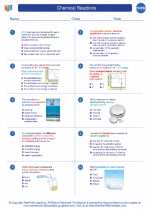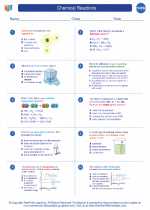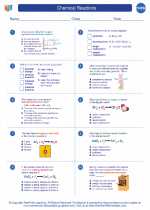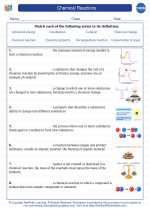Synthesis Reactions
Synthesis reactions, also known as combination or composition reactions, are chemical reactions in which two or more substances combine to form a more complex product. These reactions are represented by the general equation:
A + B → AB
Where A and B are the reactants and AB is the product. Synthesis reactions are a fundamental type of chemical reaction and play a crucial role in the formation of various compounds.
Examples of Synthesis Reactions
There are numerous examples of synthesis reactions in chemistry. Some common examples include:
- Combustion of Hydrogen: 2H2 + O2 → 2H2O
- Synthesis of Water: 2H2 + O2 → 2H2O
- Formation of Magnesium Oxide: 2Mg + O2 → 2MgO
Key Concepts
It's important to understand the following key concepts related to synthesis reactions:
- Reactants: The substances that combine to form the product are known as reactants.
- Product: The result of a synthesis reaction is the product, which is a new substance formed by the combination of the reactants.
- Energy Changes: Some synthesis reactions may release energy in the form of heat or light, while others may require energy input to occur.
- Catalysts: In some cases, synthesis reactions may be facilitated by the presence of catalysts, which are substances that increase the rate of the reaction without being consumed in the process.
Study Guide for Synthesis Reactions
When studying synthesis reactions, it's important to focus on the following aspects:
- Identifying reactants and products in a given synthesis reaction.
- Understanding the role of energy changes in synthesis reactions.
- Recognizing common examples of synthesis reactions and their significance in everyday processes.
- Exploring the use of catalysts in synthesis reactions and their impact on reaction rates.
Additionally, practicing balancing chemical equations for synthesis reactions is essential for mastering this topic.
Remember to pay attention to the stoichiometry of synthesis reactions, as it involves the quantitative relationship between reactants and products, which is crucial for understanding the amount of substances involved in a reaction.
By grasping the fundamental principles and examples of synthesis reactions, you'll be well-equipped to apply this knowledge to various chemical processes and reactions.
Good luck with your studies!
.◂Chemistry Worksheets and Study Guides High School. Chemical Reactions

 Worksheet/Answer key
Worksheet/Answer key
 Worksheet/Answer key
Worksheet/Answer key
 Worksheet/Answer key
Worksheet/Answer key
 Worksheet/Answer key
Worksheet/Answer key
 Worksheet/Answer key
Worksheet/Answer key
 Vocabulary/Answer key
Vocabulary/Answer key
 Vocabulary/Answer key
Vocabulary/Answer key
 Vocabulary/Answer key
Vocabulary/Answer key
